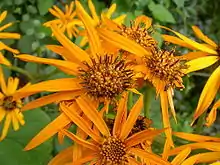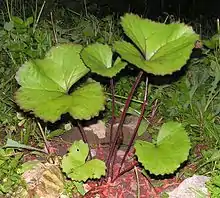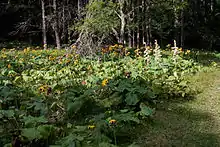Ligularia dentata
Ligularia dentata (summer ragwort or leopardplant[3]) is a species of flowering plant in the genus Ligularia and the family Asteraceae, native to China and Japan.
| Ligularia dentata | |
|---|---|
 | |
| summer ragwort | |
| Scientific classification | |
| Kingdom: | |
| (unranked): | |
| (unranked): | |
| (unranked): | |
| Order: | |
| Family: | |
| Tribe: | |
| Genus: | |
| Species: | L. dentata |
| Binomial name | |
| Ligularia dentata | |
| Synonyms | |
|
Senecio clivorum Maxim. | |
Description
It is a robust herbaceous perennial growing to 1–1.5 m (3–5 ft) tall by 1 m (3 ft) wide.[4] The dark green leaves are large, long-stalked, leathery, cordate-based, and very rounded, with serrated edges (hence the Latin dentata meaning "toothed")[5] . Orange-yellow daisy-like composite flowers bloom on thick red, mostly leafless stalks, rising above the foliage in early summer.
Cultivation
Ligularia dentata is grown as an ornamental plant, chosen as much for its bold foliage as its flowers.[6] It is used as a round-leaved accent plant or massed planting in moist sun and partial shade garden settings, and in containers. Cultivars include 'Desdemona' and 'Othello'. Selections with cream colour spotted foliage (polka dots) are also grown.


Toxicity
Ligularia dentata contains tumorigenic pyrrolizidine alkaloids.[7]
See also
References
- Natural Resources Conservation Service (NRCS). "PLANTS Profile, Ligularia dentata". The PLANTS Database. United States Department of Agriculture. Retrieved 2008-05-21.
- Botanic Garden and Botanical Museum Berlin-Dahlem. "Details for: Ligularia dentata". Euro+Med PlantBase. Freie Universität Berlin. Retrieved 2008-05-21.
- "BSBI List 2007". Botanical Society of Britain and Ireland. Archived from the original (xls) on 2015-01-25. Retrieved 2014-10-17.
- RHS A-Z encyclopedia of garden plants. United Kingdom: Dorling Kindersley. 2008. p. 1136. ISBN 978-1405332965.
- Harrison, Lorraine (2012). RHS Latin for gardeners. United Kingdom: Mitchell Beazley. p. 224. ISBN 9781845337315.
- MBG . accessed 11.30.2011
- Fu, P.P., Yang, Y.C., Xia, Q., Chou, M.C., Cui, Y.Y., Lin G., "Pyrrolizidine alkaloids-tumorigenic components in Chinese herbal medicines and dietary supplements", Journal of Food and Drug Analysis, Vol. 10, No. 4, 2002, pp. 198-211
| Wikimedia Commons has media related to Ligularia dentata. |
External links
| Wikispecies has information related to Ligularia dentata. |